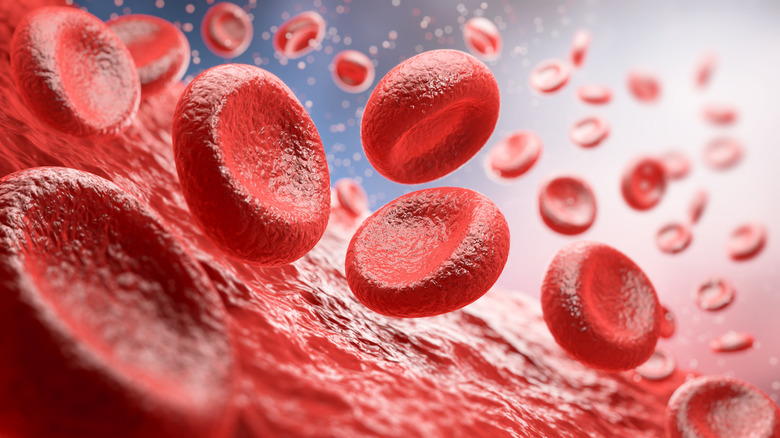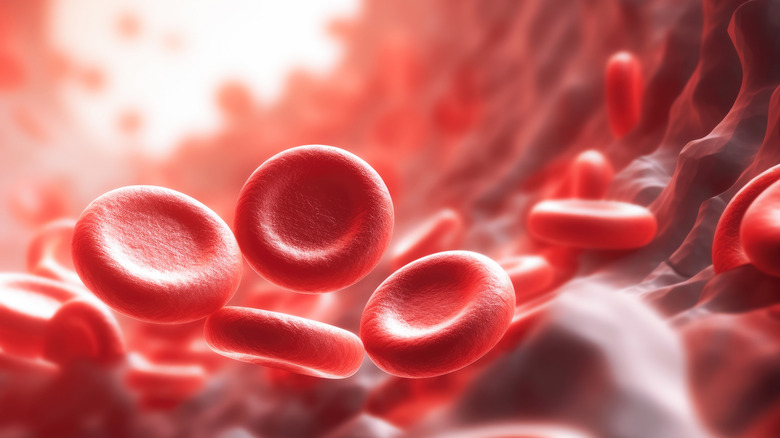If You Have One Of These Blood Types, You Could Be At Greater Risk Of A Heart Attack
Our genetic characteristics can range from our eye color to, in the case of men, being born with a recessive allele which means we get to keep our hair for much longer than those without it. Genetics also determine our blood type, which, far from just being useful to know if you're ever unfortunate enough to need a blood transfusion, can also tell you a lot about your immune system. What's more, blood type can reveal how we might be more susceptible to certain diseases and conditions later in life.
In fact, one study which suggests people with non-O type blood could be at greater risk of having a heart attack. That said, if you do have type O blood, you might be at greater risk of a painful death. While that might not seem like the nicest thing to know about yourself, it's important because it can allow for preventative treatments and inform lifestyle changes. Likewise, people with type A or AB blood could be at a higher risk of stomach cancer later in life. In short, blood type is much more important than many people realize.
Does this mean everyone with a given blood type will perish from some awful cardiac episode, stomach cancer, or in terrible pain? Not exactly — it's all just statistics — but it's probably good to know if you're at greater risk of such a thing.
Non-O type blood is associated with a greater risk of cardiovascular events
Recent research has shown that people with non-O blood types are more likely to experience a cardiovascular event, including stroke, heart failure, and heart attack, in their lives than those with type O blood. These at risk groups have a 9% increased risk of coronary events and a 9% increased risk of cardiovascular events, especially myocardial infarction. On the plus side, the researchers found no significant difference between people with type O blood (which comes with its own risks) and those with non-O blood when it came to fatal coronary events.
The research was presented in the Cardiovascular Journal of Africa and reported on research presented at two medical events: Heart Failure 2017 and the 4th World Congress on Acute Heart Failure. The wide-ranging study constituted a meta-analysis of prospective studies reporting on O and non-O blood groups and was led by Tessa Kole, a student at the University Medical Centre Groningen in the Netherlands, who along with her team looked at 1,362,569 subjects from across nine studies. They identified 23,154 cardiovascular events and investigated the association between blood group and various types of coronary events, including combined cardiovascular events and fatal coronary events.
There are several possible reasons why those with non-O type blood are more at risk
While the study didn't identify why those with non-O blood types might be more prone to heart attacks, experts believe it could be due to a clotting protein called von Willebrand factor. Those with non-O blood types may be more at risk of cardiovascular events due to the higher levels of von Willebrand factor in their blood and the excessive clotting that results.
A more recent 2025 study published in the Journal of the American College of Cardiology also showed that non-O blood types were at higher risk of cardiovascular events, this time in relation to hospitalized patients with COVID-19. Another 2023 study published in the Journal of Stroke and Cerebrovascular Diseases found that those with non-O blood types had an increased association with stroke, myocardial infarction, and peripheral vascular disease, and similarly noted the von Willebrand factor as contributing to these outcomes. The team in that study also cited factor FVIII levels, which refers to another protein in the blood that is important for clotting.
While these studies are certainly important and provide strong evidence that blood group should be considered when assessing patients for their risk of cardiovascular problems, it doesn't necessarily mean that everyone with type A, B, or AB blood will have cardiovascular issues. Lifestyle is just as important a factor, and changes to people's behavior and diet can have a profound effect on their likelihood of experiencing any such problems.


